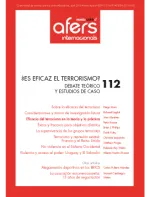When terrorism works: success and failure across different targets and goals

When does terrorism work? The debate over terrorism’s effectiveness has almost entirely focused on changes in state policy, but that is rarely the attacker’s main objective or the tactic’s most significant impact. This article presents a multi-level framework for assessing the effectiveness of terrorism that includes all three types of effectiveness that are explicit in its definition: the use of violence and the creation of fear (tactical) by an organisation seeking to survive and strengthen itself (organisational) in order to achieve political goals (strategic). The analysis sets out the key conditions under which terrorism can kill off or spread ideas, polarise societies, strengthen or destroy organisations, and instill fear in individuals, as well as situations in which success in one area complements or runs counter to achievements in another.
Key words: terrorism, violence, effectiveness, success, Islamic State, counter-terrorism
>> The full text articles of this issue are available only in Spanish language
DOI: doi.org/10.24241/rcai.2016.112.1.69